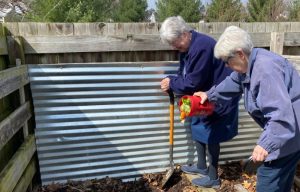 In honor of Earth Day on April 22, the columnists responded to the following question:
In honor of Earth Day on April 22, the columnists responded to the following question:
What is your personal and congregational response to the climate crisis? Have you or your community been involved with action steps around the Laudato Si’ platform?
…
Honora Remes has been a Daughter of Charity of St. Vincent de Paul for 66 years. Born in New Prague, Minnesota, she was first attracted to the Daughters of Charity because of their vow of service to the poor. Her various ministries have included ongoing spiritual direction, annual retreats, vocation ministry, serving as pastor in several Michigan parishes in the Diocese of Saginaw, serving as Daughters of Charity provincial, and offering spiritual awakening classes to homeless women in St. Patrick Center, St. Louis.
Our international and U.S. provincial Daughters of Charity Community clearly commits to protecting the present and future well-being of our planet, especially for those most vulnerable. Watching the evening news, we sorrow for our sisters and brothers battling evident horrors of climate crises. And for me — us, as Daughters of Charity vowed to service of those living in poverty — this becomes an awe-full, challenging mandate. Following the Laudato Si’ Action Platformtoward sustainable, integral ecology, our sisters are dialoguing, planning, writing, and earnestly reviewing our provincial and down-to-the-wire domestic communal practices.
And yet, in this first-world climate we live in, our responses often come across as too little too late. It feels overwhelming. We stay humbled by how deeply we’re influenced by our first-world, U.S. mentality. We pray our small, beginning efforts will somehow help our brothers and sisters suffering most from our wasteful consumer-oriented habits. And we pray for the courage to put aside our entitlement mentality. Here are some ways our D.C. provinces are committing to help protect and heal our planet. And as an international community, this feels personal:
- Our sisters have committed to planting native trees and perennials to provide habitat and food for all.
- In 2021, we modified our investment policy to screen out investments in fossil fuel and companies that violate Environmental Protection Agency and Paris Agreement standards, and we now proactively invest in companies developing sustainable fuel and food sources for those living in worldwide poverty.
- In our communal-house grocery shopping and meal planning, we try to plan and eat more plant-based meals to reduce meat consumption.
- Our website offers ecological education about how nature shows us how abundance, complexity, diversity, space and resilience help our planet flourish.
- We plan for communal meetings with inspiring prayers that reveal the beauty of God’s creation.
- We advocate for local community issues protecting our planet, like protection of waterways and access to renewable energy sources, public transportation, and air.
Here’s the mantra that might best summarize the truth we’re trying to embrace as we try to make the Laudato Si’ challenge our own: “Everything is connected!” In the midst of our everyday activities, it’s awfully challenging — probably humanly impossible — to remain painfully aware of the larger picture, to turn what’s happening to our suffering sisters and brothers into our own personal suffering, and to figure out what each of us personally is called to do about it, individually and together.
But in truth, every one of us is connected in this mission of ecological transformation, even in our small, often personal choices. Jesus said it best: “What you have done to one another, you do to me.” So, we keep at it in hope.
Originally published by Global Sisters Report
